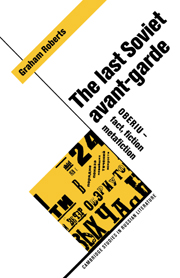Book contents
- Frontmatter
- Contents
- Acknowledgements
- Notes on transliteration and conventions
- Introduction: OBERIU – the last Soviet avant-garde
- 1 Authors and authority
- 2 Rereading reading
- 3 Language and representation
- Conclusion: OBERIU – between modernism and postmodernism?
- Notes
- Bibliography
- Index
- CAMBRIDGE STUDIES IN RUSSIAN LITERATURE
Conclusion: OBERIU – between modernism and postmodernism?
Published online by Cambridge University Press: 02 September 2009
- Frontmatter
- Contents
- Acknowledgements
- Notes on transliteration and conventions
- Introduction: OBERIU – the last Soviet avant-garde
- 1 Authors and authority
- 2 Rereading reading
- 3 Language and representation
- Conclusion: OBERIU – between modernism and postmodernism?
- Notes
- Bibliography
- Index
- CAMBRIDGE STUDIES IN RUSSIAN LITERATURE
Summary
If the OBERIU article sought to draw a fundamental distinction between ‘art’ and ‘reality’, ‘fiction’ and ‘fact’, then this study of the group as a whole has sought to separate fact from fiction, reality from myth. What it has been attempted to show is that Kharms, Vvedensky, and Vaginov all wrote metafiction, self-conscious literature which posed questions concerning the nature of fiction itself. My reading (especially in chapters 1 and 2) has been self-consciously Bakhtinian not just in the use of terms such as ‘carnival’, ‘dialogism’, and ‘heteroglossia’, but also in the way I have tried to bring my ‘active understanding’ both to OBERIU fiction and to the concept of ‘metafiction’ itself. As well as re-examining some of the assumptions conventionally made about OBERIU, the present study may in fact suggest the need to redefine ‘metafiction’ to take into account the fact that self-consciousness is not an inherent quality of any literary text, but the product of a dialogic exchange between writer, text, and reader.
Be that as it may, Patricia Waugh's reading of some of the salient features of metafiction sounds not unlike a résumé of OBERIU self-consciousness:
a celebration of the power of the creative imagination together with an uncertainty about the validity of its representations; an extreme self-consciousness about language, literary form and the act of writing fictions; a pervasive insecurity about the relationship of fiction to reality; a parodic, playful, excessive or deceptively naive style of writing.
(Waugh, Metafiction, p. 2)- Type
- Chapter
- Information
- The Last Soviet Avant-GardeOBERIU - Fact, Fiction, Metafiction, pp. 171 - 178Publisher: Cambridge University PressPrint publication year: 1997

